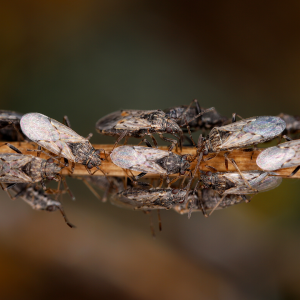 Controlling Chinch bugs should be a priority. Almost every year they are responsible for a lot of damage to lawns. They prefer St. Augustine grass, but will also feast on Bermuda, Zoysia, and Centipede grass. Chinch bugs like it hot and dry. That’s why the damage occurs in full sun, next to streets, driveways, and sidewalks. Grass damaged by chinch bugs remains attached to its roots, unlike grub damage. Before you start spraying or spreading your insect killer of choice, you need to identify the cause of your problem.
Controlling Chinch bugs should be a priority. Almost every year they are responsible for a lot of damage to lawns. They prefer St. Augustine grass, but will also feast on Bermuda, Zoysia, and Centipede grass. Chinch bugs like it hot and dry. That’s why the damage occurs in full sun, next to streets, driveways, and sidewalks. Grass damaged by chinch bugs remains attached to its roots, unlike grub damage. Before you start spraying or spreading your insect killer of choice, you need to identify the cause of your problem.
The chinch bug is a surface-dwelling creature and it is easily detected. Remove the top and bottom of a steel coffee can (3 pounds if you can find one). Push it into the soil at the edge of the healthy and damaged grass and then fill it with water. Since they don’t like water they will swim to the top. If you see them, treat them.
Ok, you found chinch bugs. Now we start controlling chinch bugs. Our all-natural products include DE (Diatomaceous Earth), Beneficial Nematodes, or my favorite, orange oil.
On the synthetic side I like Kill-a-Bug (permethrin) and Cyonara spray (lambda-cyhalothrin). As always read and follow the label directions.





